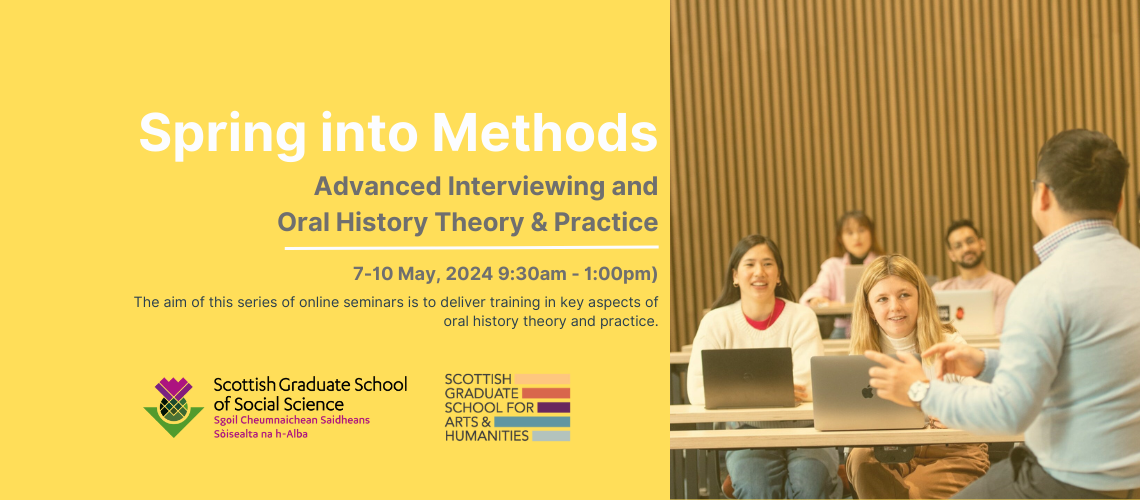The aim of this series of online seminars is to deliver training in key aspects of oral history theory and practice, including remote interviewing – practice which has largely continued since the pandemic -, ethical issues around interviewing, and enable critical reflection on interviewing as a qualitative research methodology. The Advanced Interviewing and Oral History Theory and Practice online workshop will provide doctoral students with an opportunity to focus in more depth on some of the key theoretical issues in oral interviewing and develop their interviewing practice through focusing on specific problem issues and scenarios. See below.
Additionally, students will be given opportunities to vet their research designs, conceptual frameworks and discuss key theoretical, ethical, and methodological concerns with experienced oral historians who work in a range of communities within and beyond the United Kingdom. We have expertise on such areas of study as working-class lives, war studies, gender history, health history, Scottish and British history, deindustrialization studies and medical humanities (including the impact of Covid-19).
Aims, objectives and learning outcomes:
The workshop’s primary objective is to hone and develop student’s knowledge of the key theoretical issues associated with oral interviewing, including memory, subjectivity and intersubjectivity, ethics and introduce them to oral narrative methods and narrative analysis. And the proposed 2024 training provides an opportunity for students to focus on the specific problems arising in their interview practice, providing a forum to critically reflect on interviews undertaken thus far in a group setting. For instance, with a view to improving interview skills and / or linking theory to practice.
There will be an opportunity in the final hour of the four sessions to focus on problematic project scenarios as requested beforehand from participants. Scenarios should reflect participants own challenges and difficulties in undertaking oral history: for example, developing rapport, transference of trauma, gate keeping, insider/outsider positionality, ethical issues, third party copyright issues (including the challenges of GDPR 2018), or recruitment. The scenarios will be discussed in small groups ending in a plenary feedback session providing proposed solutions and / or advice.
Learning outcomes include providing students with deeper knowledge of oral history theory; a more critical awareness of the theoretical challenges that oral historians navigate in their research; an appreciation of the legal and ethical obligations they have surrounding oral historical research; an appreciation of oral narrative methods and different approaches for analysing and disseminating interviews and related data. There will also be an opportunity to discuss the issues around remote online interviewing as an alternative to face-to-face interviewing.
Format:
Four online interactive workshops (2.5 hours) delivered via Zoom
Day 1 –7th May 2024 9.30am-1pm
Oral History Theory: Memory, Subjectivity and Intersubjectivity
Day 2 – 8th May 2024 9.30am-1pm
Ethical issues and trauma in oral interviewing
Day 3 —9th May 2024 9.30am-1pm
Remote Interviewing Practice in an Online World
Day 4 – 10th May 9.30am-1pm
Narrative analysis and use of oral testimony in thesis research and publication
Prior learning requirements for participants:
The 2024 workshop is designed for those PG students using oral interviewing techniques who have already accrued some practice in interviewing. They should also have ideally undertaken prior oral history OR interviewing practical training. Latter is not compulsory though.
Please Note:
In order to manage the volume of interest for Spring into Methods in a fair and equitable way, we ask that you submit a registration of interest form (below) to indicate you wish to participate in this workshop. Submitting a registration of interest does not automatically guarantee your place in a workshop. Once you submit your registration of interest, you will receive a confirmation email within 1 business day.
We will review all registrations of interest and we will be in touch w/c 01 April to confirm whether or not you have been allocated a place in this workshop. If you are allocated a place on the workshop, you will receive a confirmation email and event details will be sent to you ahead of the event. If you are not allocated a place in this workshop, we will email to let you know and will continue to hold your position on the wait list should a place become available.
You may submit a registration of interest for up to two Spring into Methods workshops. If you have submitted an expression of interest in another workshop, you will receive any communications about that workshop separately.


